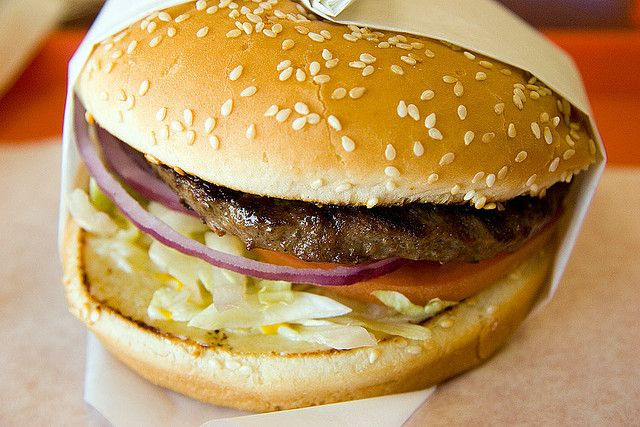Why Did The Lab-Grown Hamburger Fail The Taste Test? Many Factors Contribute To Meat's Appeal

The world’s first lab grown meat was tasted in hamburger form last week. But although it cost almost $400,000 to develop, using cow muscle cells that multiplied into over 20,000 strips of muscle sinew, tasters still said that it tasted “close to meat” but that it was a little harder and drier than they expected. The burger tasted bland because it was missing a crucial component: the fat. And it’s the fat that combines with a flavor known as umami in a process known as the Maillard reaction that makes meat so appealing.
Umami, Japanese for “pleasant savory taste,” was added to the list of basic tastes, which includes salty, sweet, sour, and bitter, only recently. It’s formed by three substances: glutamate (found in parmesan cheese, soy sauce, and sun dried tomatoes), inosinate (found in meat and fish), and guanylate (found in dried mushrooms), according to The Washington Post.
Read More: World’s First Lab-Grown Burger: The London Taste Tests Are In [VIDEO]
A dish with at least two of these substances can enhance the flavor of the umami. Humans are already drawn to glutamate naturally — the amniotic fluid that was in our mothers’ wombs was full of it. Cooking releases glutamate from the food, and scientists believe umami helps humans choose foods that are high in protein.
When umami flavors combine with fat, and they’re cooked, the fats start to oxidize creating scents that are only enhanced by what’s called the Maillard reaction. When carbohydrates and amino acids combine with heat and moisture from the meat, they produce the aromas that “make us go weak at the knees,” Adam Drewnowski, director of the Nutritional Sciences Program at the University of Washington, told The Washington Post.
A number of different chemicals cooking in the meat are responsible for its smell, which can often be described in a number of different ways, including fruity, nutty, and musty. In fact, scientists estimate that between 75 and 95 percent of what we taste is actually our sense of smell. So when the lab-grown meat was being cooking, it makes sense that the chef who cooked it, Richard McGeown, told The Post that the scents were “subtle.”
Read More: $325,000 Burger: Lab Grown Meat Gets Its First Taste Test
When Professor Mark Post, the creator of the lab-grown meat, develops the so-called Lab Meat 2.0 in a few months, he says it will have lab-grown fat on it as well, and they’ll be able to produce a juicier, more flavorful burger.



























